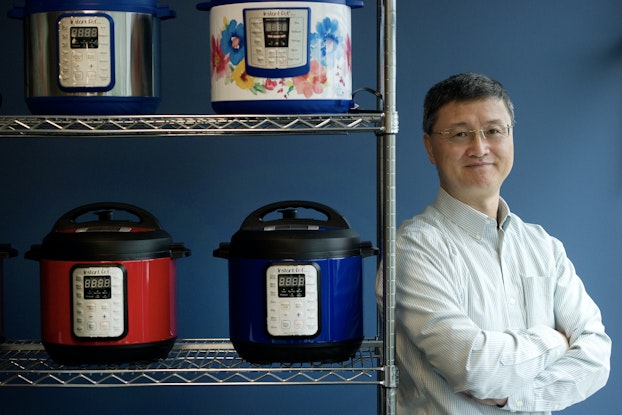
Instant Pot inventor Robert Wang and vaudevillian Will Rogers would be kindred spirits if a time machine could arrange a meet up to discuss the merits of paid product promotion.
"Advertising is the art of convincing people to spend money they don’t have for something they don’t need" is an oft-quoted gibe of Rogers, who also said if companies spent as much money on product improvement as was spent on advertising, then advertising wouldn’t be needed in the first place.
Wang, whose wildly popular Instant Pot programmable electric pressure cooker is disrupting the kitchen goods category, followed Rogers' sage advice and that’s why advertising has never been part of Instant Pot’s business plan—not in 2010, when Instant Pot debuted after 18 months of research and development; nor today, as sales continue to double every year and Facebook followers swell to 1.6 million. Instant Pot is manufactured by Instant Brands Inc., in Ottawa, Ontario, where Wang is CEO.
Fueling word of mouth
Rejecting advertising is not scorn on Wang’s part. He’d rather invest in innovation that fuels word-of-mouth marketing instead and his multifaceted approach is intriguing. It’s a strategic leap some entrepreneurs are unwilling to take. Some 30,000 new products are introduced each year with a failure rate of 80% to 85%. A chief reason new products fail is not because TV pitchman Billy Mays didn’t shill them. Failure is often tied to underestimating the consumer – and Wang ensured that would never happen with Instant Pot.
In an interview with CO—, Wang divulged a unique formula underpinning the success of the cooking device, one that eschews advertising, and why Instant Pot’s loyal following refer to themselves as “Potheads.” Wang insists on
- reliance on word-of-mouth marketing, with exceptional support and service as fuel for ongoing dialogue – both flattering and not;
- continual innovation and a highly disciplined product launch cycle (12-18 months), more typical of software development than consumer goods; and
- near-maniacal attention to consumer product reviews. Wang reads every one of them post-launch, with special focus on the most critical.
“Personally, I believe word of mouth is the most powerful form of marketing,” Wang told CO—. “Testimonials from trusted friends and colleagues are incredibly more persuasive than running ads on TV and radio,” he said. “And, very scalable.”
The vast majority of consumers, 83% worldwide, trust word-of-mouth recommendations from friends and family and 66% trust opinions posted online by consumers they do not know, according to Nielsen’s Global Trust in Advertising research. As a group, Millennials aged 21-34 are more trusting, 85% and 70%, respectively.
Paid advertising is unnecessary, Wang said, and could compete – indeed conflict – with word-of-mouth messaging. “To me, testimonials and in-depth reviews are more effective,” he said. “I want people’s honest opinions to be published” rather than marketing spin that could ultimately backfire, as was the case with the famous flameouts of Juicero in 2017 and Microsoft’s Vista 10 years earlier. Inflated claims and performance problems triggered customer revolts that doomed the premium-priced home juicer and the Windows operating system when the colossal chasm between marketing hype – and product experience – became abundantly clear.

I believe word-of-mouth is the most powerful form of marketing.Robert Wang, Instant Pot inventor and CEO of Instant Brands
CPG upstart that thinks like a tech startup
Instant Pot is not Wang’s first entrepreneurial venture. A software engineer with a PhD in computer science, he founded three other companies in the telecom space where nonstop innovation is table stakes. Wang knows a highly disciplined approach to product development makes each new model of Instant Pot smarter than the last and clears a path for new products.
“In telecom and software engineering, we do fixed releases,” Wang told CO—. “There is a deadline. You have to deliver. At a certain point, you have to deliver your product. That was the culture within Instant Pot at launch and is the culture today.”
The Instant Pot development team seeks out customer complaints to discover opportunities to improve existing features, add smart new functionality, and rethink automation such as whether it’s better to cede control to the cook to make decisions rather than the embedded microprocessor.
For example, one customer review complained that automatic release of steam at the end of the cooking cycle produced disappointing results with rice. While a programmed delay of steam release would improve the outcome of rice with its high starch content, that delay would not be kind to vegetables and some delicate seafood that easily overcook without immediate release of steam. This consumer input led to development of two steam controls, one for immediate release and another that delayed release to achieve the perfect taste and texture of sticky rice, a popular Thai dish. Such refinements allow cooks to adjust for different recipes and personal taste preferences.
Still a darling, still breaking records
Instant Pot, already the No. 1 top-selling item on Amazon Prime Day in 2016 and 2017 (non-Amazon products) held onto its crown and shattered records as a Prime Day top seller in 2018, when more than 300,000 units sold in 36 hours’ time. Kohl’s told CNBC it sold 60 Instant Pots per minute online Thanksgiving Day and Walmart reported Instant Pot was the most popular item sold online in 33 states over Cyber weekend.
The popular 7-in-1 Instant Pot has amassed 29,000 reviews on Amazon and each new review can influence future product development. With NPD Group estimating U.S. household penetration of multi-cookers at a skimpy 11.5%, opportunity abounds for Instant Brands to increase its presence in the world’s kitchens and that’s Wang’s objective in 2019.
The newest innovation, the Instant Pot Ace “cooking blender,” a Walmart exclusive that debuted September 2018, will have Wang watching consumer reviews closely.
“Yes, I really read every single review when a new product is launched,” he told CO—, estimating he’s read 10,000 to 15,000 reviews. “You have to read a large number to understand why customers are not happy with a certain feature, or lack of it – or a service, or lack of it.” It’s important to have a collective sense of a large number of reviews in order to identify the issues that merit attention, he added.
CO- aims to bring you inspiration from leading respected experts. However, before making any business decision, you should consult a professional who can advise you based on your individual situation.
CO—is committed to helping you start, run and grow your small business. Learn more about the benefits of small business membership in the U.S. Chamber of Commerce, here.

What can membership do for your business?
Gain tools to stay informed, competitive, and connected by becoming a U.S. Chamber of Commerce member. Membership gives you direct access to expert policy insights, economic updates, and exclusive resources designed to help your business thrive. From behind-the-scenes analysis from D.C. to exclusive discounts and expert support, U.S. Chamber membership helps you navigate change and seize new opportunities.




